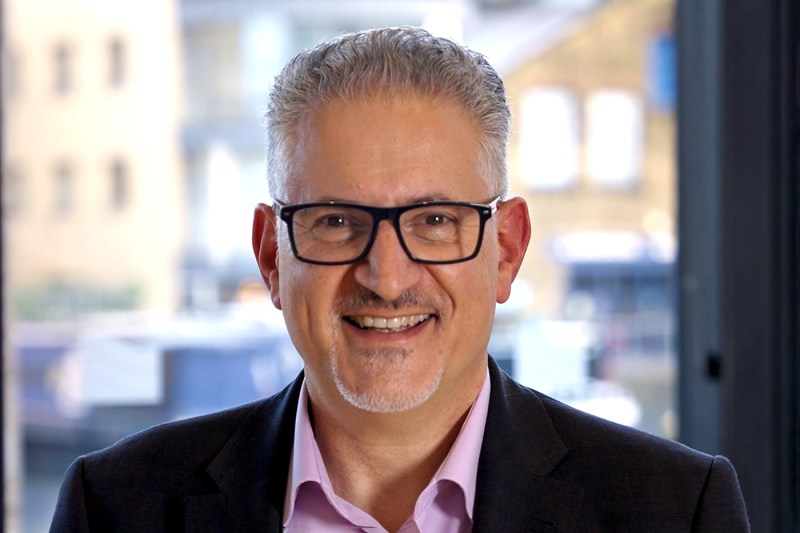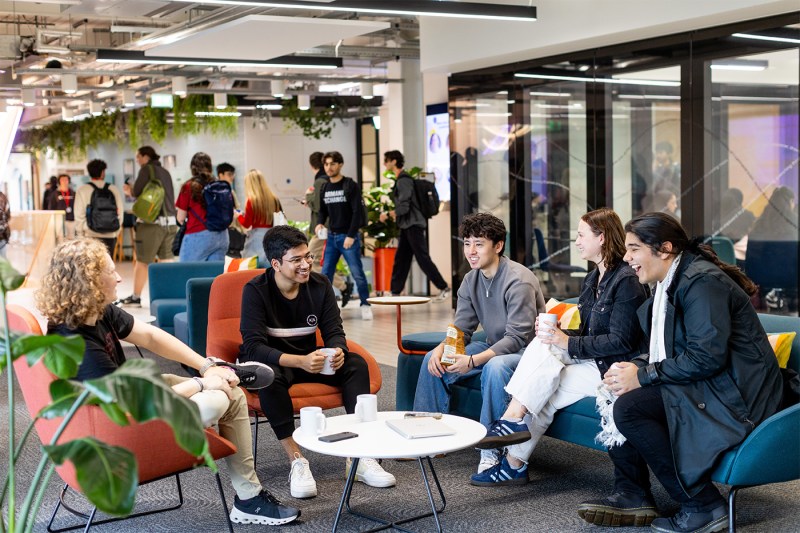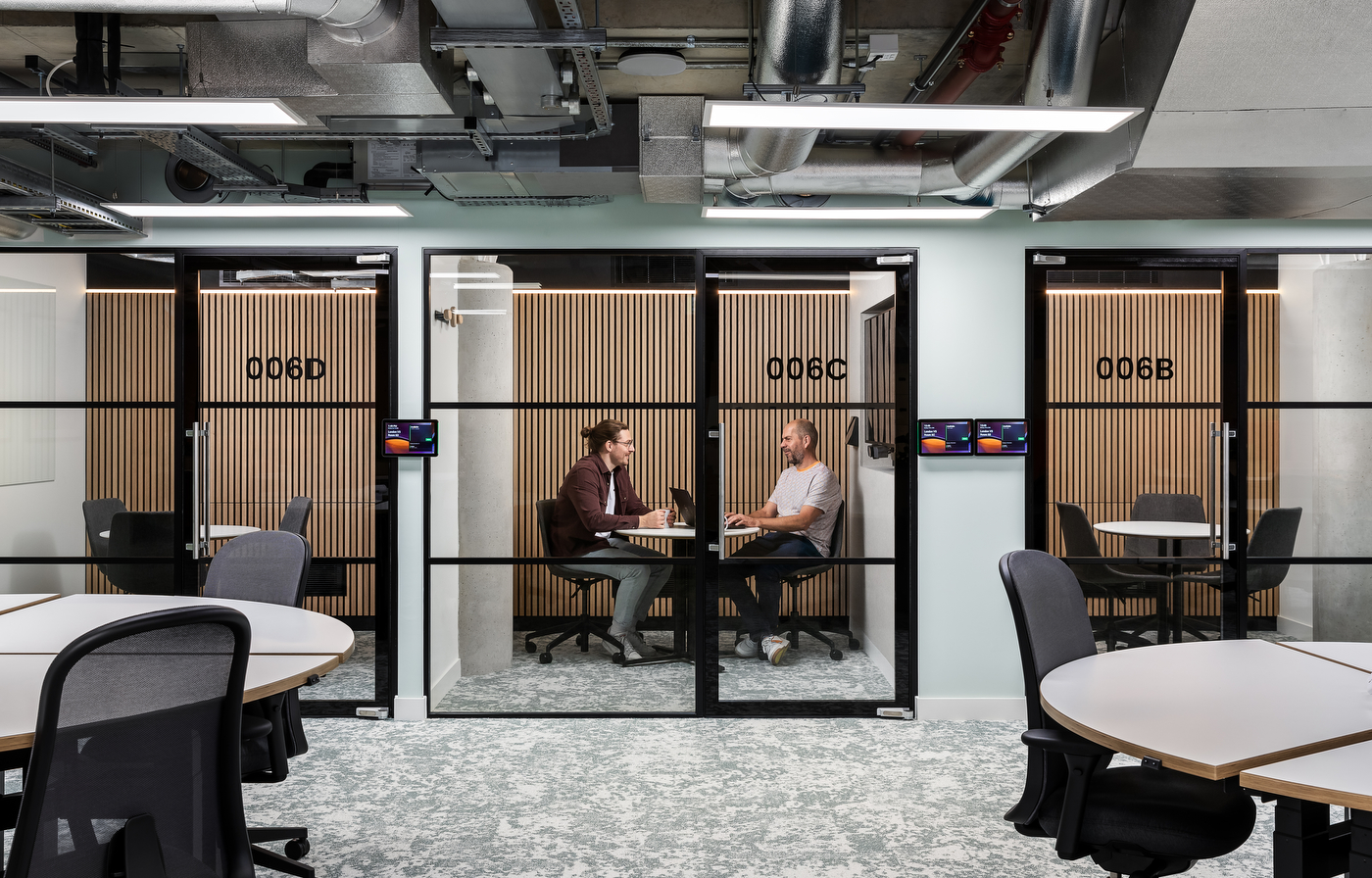LONDON — By the time 2025 is over, economics major Vyom Agarwal will have completed three co-ops in 12 months.
Two of those co-ops — immersive full-time placements in industry — were based at Northeastern University’s own startup hub in London.
Opened in February 2024, the space is home to 22 external startups and acts as a launchpad for entrepreneurship.
Those based at the Vine Street office, with its boardroom, private pods and events and meeting areas, are given discounted rates on prime location desk space. In return, they sign up to work with the university and its students, including offering mentoring and other opportunities.
Agarwal, from Kolkata in India, kicked off his co-op experience in January when taking a position with Wavery Consulting, a firm based at the hub, helping them with their go-to-market strategy.
A second placement followed — from June until September — working with Z/Yen, a commercial think tank based in the city’s traditional finance district.
With no letup in between, he was back to the startup hub, with its view of a surviving part of the city’s Roman wall, for his third co-op, this time having secured a position with consultancy firm Stratinn.
Agarwal’s co-op experiences have not come at the expense of being involved with the university community. The 20-year-old was formerly president of the Finance Society and is currently a Husky ambassador, a role that sees him help prospective students understand what studying at Northeastern entails.
“I love it,” the third-year student said of his balance between work and study. “I wouldn’t trade it for anything in the world.
 EdenBase co-founder, Eric van der Kleij, praised the partnership his tech investment fund enjoys with Northeastern at the startup hub. Courtesy photo
EdenBase co-founder, Eric van der Kleij, praised the partnership his tech investment fund enjoys with Northeastern at the startup hub. Courtesy photo
“Every new or prospective student I speak to, I always tell them, ‘You have no clue what’s waiting for you.’ The number of opportunities that London as a city, and with Northeastern being in London, has to offer, is incredible.”
Agarwal dreams of landing a job in consultancy when he graduates and eventually hopes to establish his own business. For him, the opportunities afforded by Northeastern and the startup hub have offered the first stepping stones toward realizing that dream.
“Northeastern, because of the teaching model it has, I think, has really put the students at an advantage,” he said
“A company that is in a hiring position … what it really cares about is if you have some work experience that you’re bringing in with you. That’s why I feel like Northeastern really worked out for me. This co-op model, I think, is a big hit.”
The startup hub was a factor in Northeastern’s London campus being named as part of the six-institution shortlist in the “Outstanding Entrepreneurial University” category at the Times Higher Education Awards. A winner is due to be announced by the British magazine in November.
Co-ops are not the only opportunities available at the startup hub. Tech fund EdenBase, one of the resident businesses, has announced that it will create openings for 20 students to assist with its new quantum investment venture.
Situated in a bespoke area of the hub called QBase, students will complete research and due diligence on quantum companies that EdenBase is looking to invest in with its planned $100 million fund.
Company co-founder Eric van der Kleij told attendees at QBase’s launch last month that its move into quantum had proved an “amazing opportunity” in its relationship with Northeastern.
“They’ve enabled us to create something quite unique that we hope will be very successful and scale globally,” he said.
The partnership, which includes associate professor in computer science Tobias Hartung serving as an adviser to the fund, has already benefited from student involvement, van der Kleij added.
The former Downing Street tech adviser explained how EdenBase this year commissioned students undertaking a business administration master’s degree to carry out research on which companies and countries might be ripe for early backing by quantum investors.
“They went a bit further than we asked,” he said. “They actually built a tool that allows us to filter by region and figure out which ones have failed. Actually understanding as an investor which ones have failed and why is very important.
“So we already had that benefit and we’re now planning the next phase, which is students having an opportunity to work with the quantum fund to help produce the competitive analysis for each company. For students in the room, we think it will make you the most employable [graduates] after the work we do together.”
Naomi Goulder, deputy dean on Northeastern’s London campus, said EdenBase had “really pioneered the way in something that is absolutely central to Northeastern’s vision” of experiential education.
Two students in the audience hearing about future opportunities at the QBase launch were Meriam Chebil, 20, and Anton Pollio, 21. The two are on the leadership team at Northeastern Young Entrepreneurs (NYE), a student group that also offers real-world work experience.
It allows students the chance to work on a consultancy challenge with a startup business. The prize at the end is an internship with the partner.
This year, they collaborated with Sertie.io, an educational technology startup. Pollio said the United Kingdom-based firm asked for analysis as it looked to decide what international markets could work for a product expansion.
 Vyom Agarwal (second from left) has undertaken three co-op placements, with two of them based at Northeastern’s startup hub. Photo by Carmen Valino for Northeastern University
Vyom Agarwal (second from left) has undertaken three co-op placements, with two of them based at Northeastern’s startup hub. Photo by Carmen Valino for Northeastern University
Students worked in teams to research different countries before pitching their final ideas to Sertie’s board. Pollio, the group’s student adviser, said the four winners were embedded with Sertie over the summer, with one being offered a job at the end.
“They were able to go in, work with the chief executives directly and implement their ideas to see if they’d work,” explained the law student.
NYE, which also runs career assistance workshops and guest speaker sessions, has previously advised a vegan high heels producer based in Switzerland on how to appeal to a young audience. Its current project involves partnering with a London-based mergers and acquisitions startup.
With internships on offer, competition is fierce among students to take part in the consultancy challenge, with just 35% of applicants making it through to the team-based finale, said Chebil, the current president and a business major from Los Angeles.
Pollio admitted she became involved with NYE almost accidentally, signing up on a whim during her first year. But the Londoner said she has come to treasure its open-door policy.
“Honestly, I just fell in love with what it stood for,” said Pollio, “because it was all about encouraging people who didn’t feel like they should be in the entrepreneurial space, into it.
“You don’t need to know anything when you come in — there’s no need to wear suits, there’s no need to be formal, we’re not going around throwing out corporate lingo or anything. It’s all about just building a network and building a community on campus. And I really love that.”
Students have voted with their feet, with NYE boasting 120 members at last count. But it is the partnership with the university that has bolstered the entrepreneurial group’s success, with business lecturers giving advice on how to make a pitch, computer science experts hosting sessions on coding and careers staff offering advice and tips.
“The professors and the staff at this university genuinely want to see us succeed,” said Chebil. “They have our backs.”
